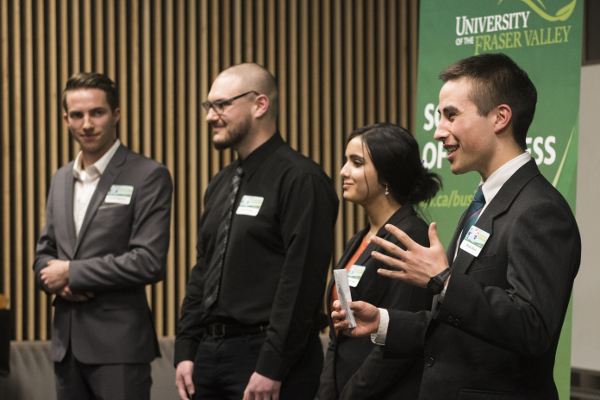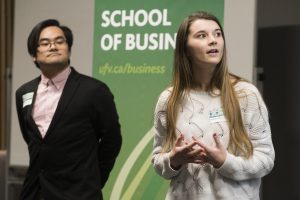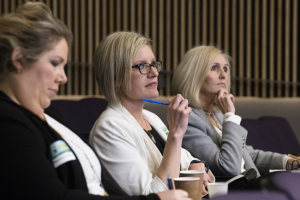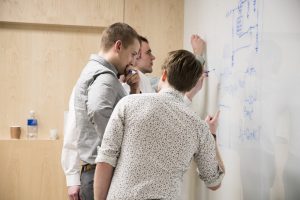 Following the UFV Sustainability Case Competition, we sat down with competition organizer, Jillene Marlowe, from the School of Business to ask her about the competition.
Following the UFV Sustainability Case Competition, we sat down with competition organizer, Jillene Marlowe, from the School of Business to ask her about the competition.
What was the Sustainability Case Competition (SCC)?
The SCC was a one day case competition available to all UFV students where student teams of 3 or 4 got to spend the day solving a region specific problem the Fraser Valley is facing. Each team was given the problem in the morning and had 3 hours to work with their team to analyze the problem, provide recommendations, and develop an implementation plan. The analysis needed to be based on the concepts of sustainability (economic, environment, and social) and tied to the UN Sustainable Development Goals and Strategies outlined in the City of Abbotsford’s Official Community Plan.
Can you further outline what this year’s case problem was that the students had to solve?
This year we asked the students to assess the growing population and increase in housing prices we are seeing as residents in Abbotsford. In assessing this problem the nine student teams had to identify and describe all sustainability impacts this problem has on the region and discuss how the City of Abbotsford should respond and prepare for these impacts to the stakeholders.
We wanted to have a problem that was relatable and something that is on the minds of students, and many stakeholders. I believe this problem was a perfect fit to engage the students and get them excited to identify ways to address a problem that is so real for many.

What disciplines were the teams from? Why was an interdisciplinary competition so successful?
This year we were very pleased to have participants from many different programs across UFV, we had students from Trades, Global Development Studies, and Business, as well as a mix of domestic and international students participating. Having interdisciplinary teams adds value to presentation as it provides different ideas and views on a common problem.
Who were the winners, how did they approach the case? What were their recommendations and implementation strategy? What set their idea’s apart?
The winners were made up of individual registrants that were placed together for the first time on the morning of the competition. They were all from the School of Business, however the team of four consisted of a first year, second year, third year, and fourth year student, which made for an interesting mix.
The winning team analyzed the case considering the three concepts of sustainability equally to provide a balanced assessment that effectively considered both the UN Sustainability Development Goals, and specific strategies outlined in the City of Abbotsford’s Official Community Plan. In the analysis the team identified the impacts such as an increased cost of living for residents in the region, social wellness, and efficiency of local resource usage. They effectively considered how these impacts linked to the local stakeholders including small business owners, the Stó:lō First Nation, and residents. They came up with some excellent recommendations on community housing options and hydroponic farming that I believe the City of Abbotsford will be very interested in hearing.
Do you plan on providing City of Abbotsford with the student’s ideas?
A package will be provided to the City of Abbotsford that outlines all the amazing ideas we heard from the nine student teams that participated in the SCC. I hope to see positive change come from the work the students completed, and that the City of Abbotsford will consider many of the recommendations for future strategies that they put forth to aid in solving the problem we addressed.

How did you decide who the winning team would be?
We had three excellent panelist who live and work in the region that took on the important and difficult role of assessing the team presentations.
The first was Theresa Coates, our alumni representative who graduated from the BBA program in 2016 with a minor in economics. Theresa was able to give a relatively current student perspective as well as being able to provide insight on life after UFV here in the Fraser Valley region. Our second panelist was Tillie Parmar, who was our faculty representative. In addition to being known by the students as an accounting instructor at UFV, Tillie has lived in the region for approximately 20 years and is also an alumni of UFV. This enabled Tillie to provide a multi-stakeholder perspective to students. Our third panelist was Councillor Patricia Ross, who has served as a city Councillor since 1994 and has been championing sustainability in our region. Councillor Ross is a fellow of LEAD (Leadership of Environment and Development International) and for 14 years ran her own business that was the first to provide recycling collection for businesses and multi-family residences in the region.
We were very fortunate to have their involvement, as the perspectives and the questions that came from this panel were enriching and really represented the region. This added to the value of the student experience giving real stakeholder perspectives on their ideas.
Why is sustainability an important topic for students to contend with? How will the ability to think holistically about sustainability help them in their future careers?
Sustainability is becoming more and more of a household term. It once was something that stakeholders addressed as a “nice to have”, where as now addressing sustainability is expected. Sustainability is not a new concept, however, it is only in the past decade more stakeholders started taking the concepts of sustainability seriously. That is most likely due to the pressure we are seeing by consumers, residents, and investors to act sustainably or risk not gaining a license to operate.
For many, even now when sustainability is used in discussions, people think environment, however it is important to get more and more people seeing the concept of sustainability as also economic and social. It was exciting to see students focus largely on social impacts during their analysis for the SCC, versus the common environment impacts you see brought up more often. Not to say environment impacts are not equally as important, but it is important to balance your considerations of a problem with the other impacts of sustainability as well.
What is the future vision for this competition? What changes would you make?

As a first year, we are quite happy with the participation and support we received for the SCC. However, we want to grow this competition to have it meet its full potential. This means getting more students and stakeholders involved. I hope that in future years the SCC becomes an event that students look forward to and look back on as something that enriched their time at UFV. We also would like to have more stakeholders involved, and something they are excited to partner with UFV on. Getting more stakeholders in the room to hear the bright ideas our students have here at UFV is something that can influence positive change for the region while also empowering students which makes me very excited.
Our short term goals are to bring awareness to regional sustainability issues and provide students with the tools needed to prepare them for life after UFV. I hope the long term outcome of getting students excited about sustainability will be to create a trickle effect that brings positive change to our region now and in the years to come as these students become the other stakeholders.
Interested in seeing photos from the Sustainability Case Competition? Check out UFV’s Flickr account.
